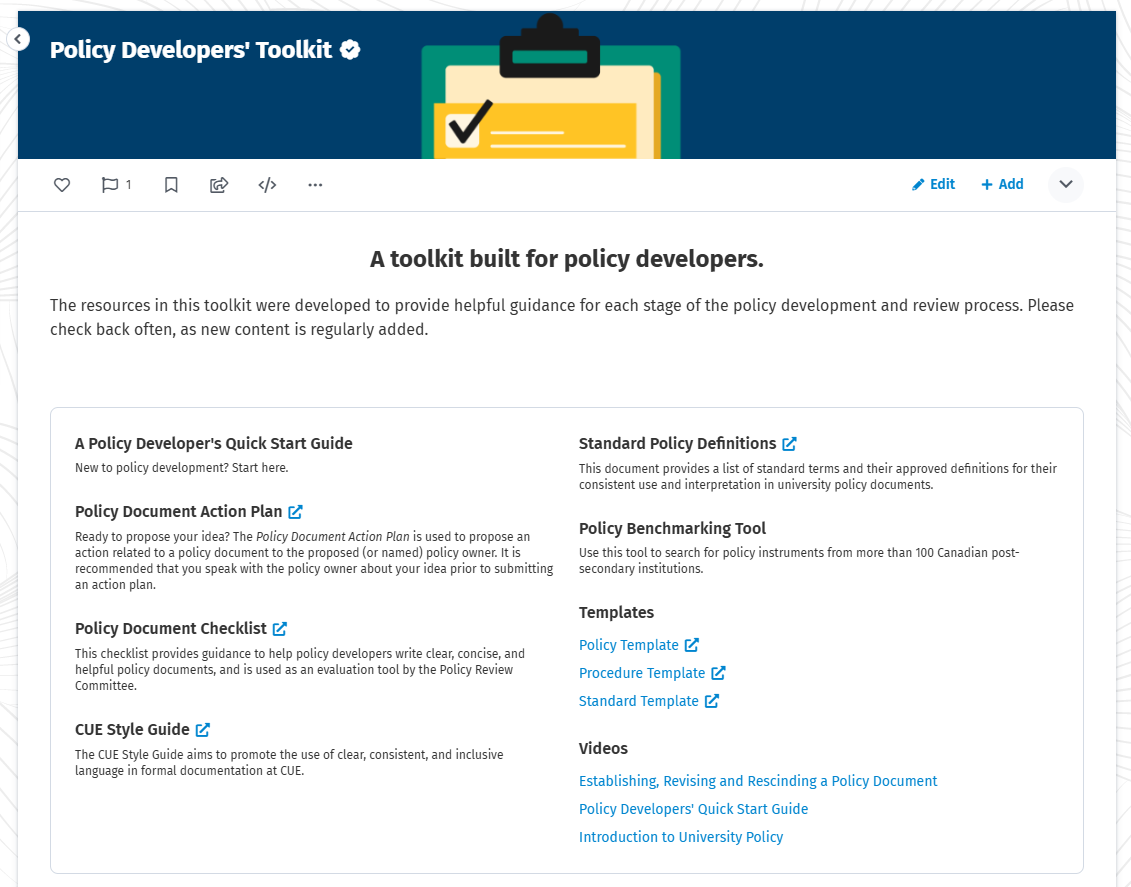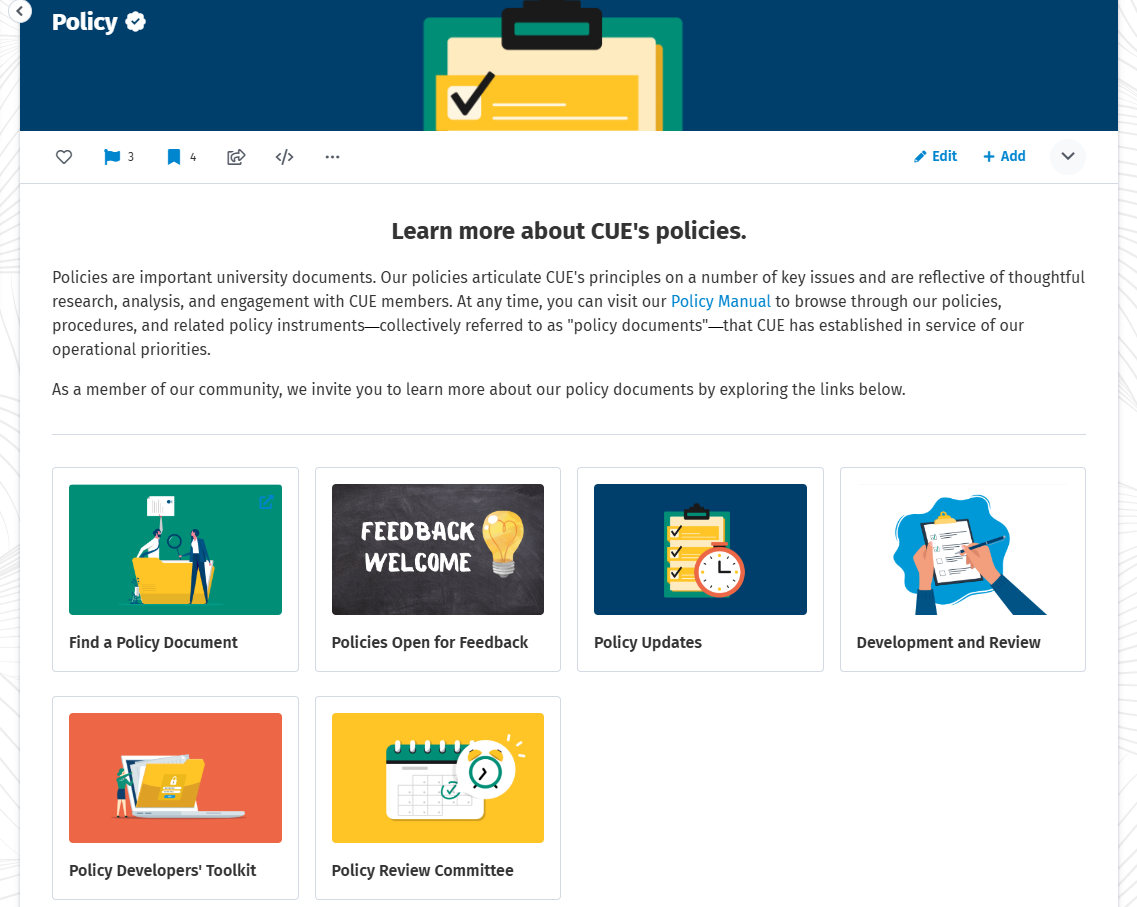A practical addition to your policy program
As a policy administrator, few accomplishments are more meaningful than helping a colleague navigate a complex policy project. One of the most fulfilling aspects of my role as Policy & Records Analyst is providing guidance and support, especially when policy development and review feel unfamiliar or overwhelming.
At Concordia University of Edmonton (CUE), a small university in Edmonton, Alberta, known for its strong sense of community, that supportive spirit extends to our policy work. Our approach emphasizes collaboration, clarity, and long-term sustainability, ensuring that institutional policies remain aligned with the university’s vision, mission, and strategic objectives.
When I joined CUE, my aim was to establish a consistent, university-wide process for developing and reviewing policies. Early on, I recognized that building an effective policy program involves more than setting rules or monitoring compliance. It requires meaningful engagement with the people who contribute to the work. At CUE, policy development is a shared responsibility. Developers come from across the institution, bringing diverse expertise and varying levels of experience in policy writing. To support their success, I created the Policy Developers’ Toolkit—a user-focused resource designed to empower policy developers to engage confidently and effectively in the policy development and review process.
Why we created the toolkit
CUE’s five-step policy development and review process is designed to be straightforward, consistent across all policy instrument types, and easy to follow:
- A new policy action (creating a new policy or revising or rescinding an existing one) is proposed through a Policy Document Action Plan.
- Upon endorsement, the policy owner assigns a policy developer or development team.
- The development phase includes benchmarking, drafting, and consultation.
- The policy is submitted to the Policy Review Committee for review.
- Final approval is sought from the appropriate institutional authority.
Although the process itself is simple on paper, Step 3—development and revision by the policy developer—is often the most challenging. Policy developers are typically subject-matter experts, but they may not be familiar with translating their expertise into policy language that is clear, concise , and helpful.
As I worked alongside developers, I realized that providing one-on-one support for each project would not be sustainable long-term. I began by sharing checklists and other key reference documents, but it soon became clear that we needed a more comprehensive, centralized resource. The goal was twofold: to build confidence and understanding among our developers and to enable me, as the policy administrator, to manage multiple projects efficiently while still offering meaningful support.
Bringing these resources together in a central repository also allowed me to understand how they worked together and identify any gaps. This insight allowed me to refine the tools, build coherence, and ensure the approach remained practical and user-friendly.
What’s in the toolkit?
The Policy Developers’ Toolkit is hosted in CUE Connect, our employee intranet. It is organized around the key stages of the policy development and review cycle, and is designed to meet developers where they are—whether they are new to policy work or more experienced.
Current resources include:
- Policy Document Checklist – used by both policy developers and the Policy Review Committee to ensure policies are clear, concise, and helpful.
- Templates – standardized, fillable templates for various policy instruments.
- Standard Policy Definitions – to support clarity and consistency across all documents.
- Policy Benchmarking Tool – a custom Google search engine that scans 100+ Canadian post-secondary policy sites based on a keyword search.
- Instructional Videos – short walkthroughs, including a Quick Start Guide for new developers.
- Links to Key Resources – including our policy repository and essential documents like the Policy Document Action Plan.

Building Your Own Toolkit
If your institution does not yet have a policy development toolkit, or you are in the process of building one, here are a few steps I recommend:
- Find a Home for Your Toolkit: Use a central, easily accessible location such as an employee intranet.
- Start with What You Have: Gather existing resources like templates, checklists, and process guides.
- Communicate Often: Link to the toolkit in training materials, auto-replies, and communications with policy developers.
- Invite Feedback: Engage your users to learn what is working and what could be improved.
- Review and Improve: A good toolkit should evolve with your policy program. Make updates a regular part of your work.
When we launched our toolkit, it coincided with significant revisions to our Policy on University Policy Documents. This timing allowed the toolkit to support implementation and promote a smoother transition. A well-timed, accessible toolkit can be a powerful aid in navigating institutional change.
Final Thoughts: Policy as a Community Effort
To me, policy work is one of the ways we express care for our institution and for one another. The Policy Developers’ Toolkit reflects that care by prioritizing clear guidance and accessible support to help our colleagues navigate what can sometimes feel like a complex process. While it is a practical tool, I also see it as a statement: policy work matters, and the people doing it deserve the right support to do it well.
Over time, consistent communication helped embed the toolkit into CUE’s institutional culture. It has become a staple in our policy trainings, a standard reference in policy-related email communications, and a key component of our broader efforts to promote policy literacy. Housed within our centralized hub for policy information, the toolkit makes it easy for employees to find the right resources at the right time.
As the toolkit becomes further integrated into our policy infrastructure, we continue to expand its scope. Planned additions include interactive training modules and workshops designed to build engagement and deepen institutional capacity in policy development. In this way, the toolkit is not a static product, but a growing and evolving support system that reflects our commitment to a thoughtful, community-centered approach.

As policy administrators, we know that policy work is both foundational and deeply human. While our documents provide structure, it is the people who shape them. The support they receive plays a vital role in ensuring policies reflect our institutional values and serve our communities well. By investing in the individuals who create and revise our policies, we help foster a culture of collaboration, inclusion, and shared purpose.
-
If you have tools or strategies that have proven helpful in your own policy toolkit, or if you are currently building one for your institution, I warmly invite you to share your insights and experiences. Please feel free to leave a comment or reach out to me at christine.valentine@concordia.ab.ca. I look forward to connecting and learning from your journey.